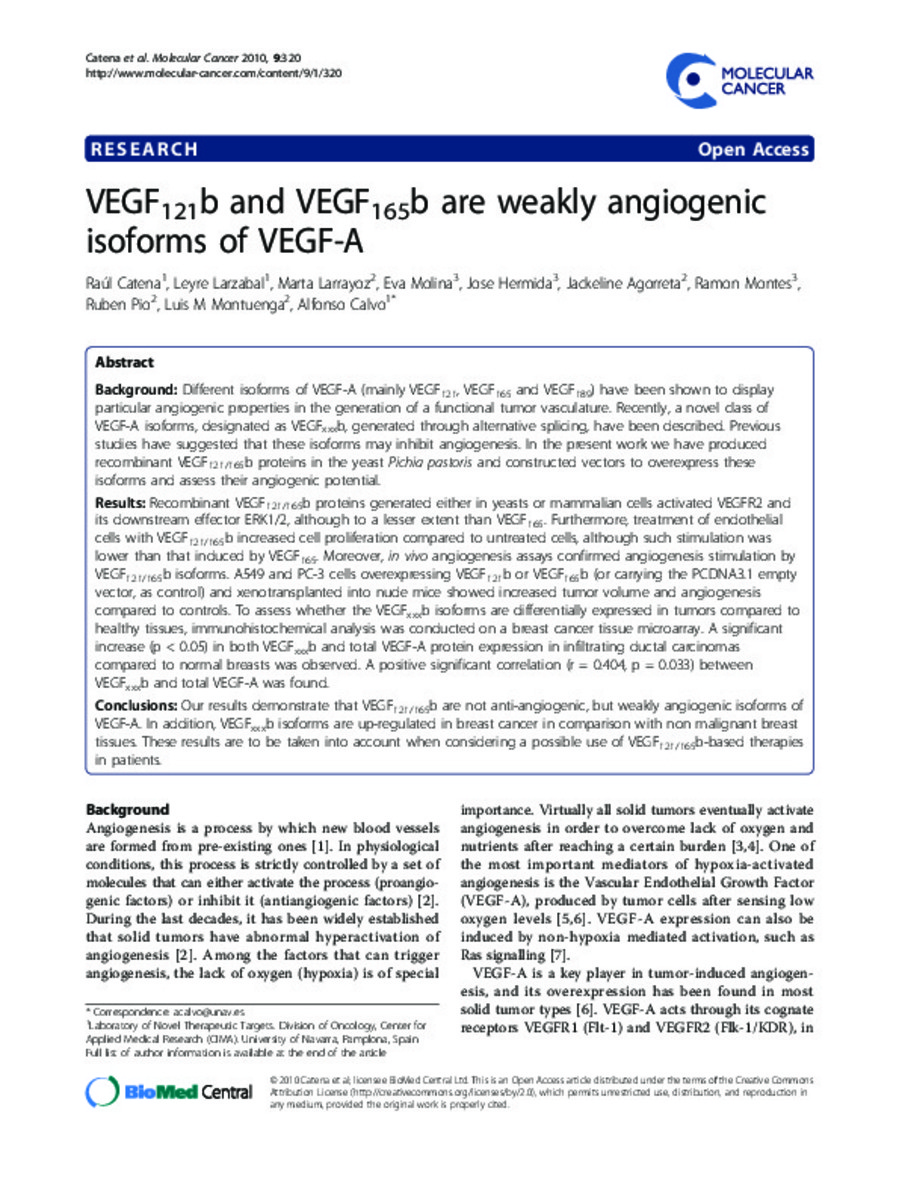Full metadata record
| DC Field | Value | Language |
|---|---|---|
| dc.creator | Catena, R. (R.) | - |
| dc.creator | Larzabal, L. (Leyre) | - |
| dc.creator | Larrayoz, M. (Marta) | - |
| dc.creator | Molina, E. (Eva) | - |
| dc.creator | Hermida, J. (José) | - |
| dc.creator | Agorreta, J. (Jackeline) | - |
| dc.creator | Montes, R. (Ramón) | - |
| dc.creator | Pio, R. (Rubén) | - |
| dc.creator | Montuenga-Badia, L.M. (Luis M.) | - |
| dc.creator | Calvo-González, A. (Alfonso) | - |
| dc.date.accessioned | 2011-02-28T11:20:34Z | - |
| dc.date.available | 2011-02-28T11:20:34Z | - |
| dc.date.issued | 2010-12-31 | - |
| dc.identifier.citation | Catena R, Larzabal L, Larrayoz M, Molina E, Hermida J, Agorreta J, et al. VEGFb and VEGFb are weakly angiogenic isoforms of VEGF-A. Mol Cancer 2010 Dec 31;9:320. | es_ES |
| dc.identifier.issn | 1476-4598 | - |
| dc.identifier.uri | https://hdl.handle.net/10171/16713 | - |
| dc.description.abstract | Background: Different isoforms of VEGF-A (mainly VEGF121, VEGF165 and VEGF189) have been shown to display particular angiogenic properties in the generation of a functional tumor vasculature. Recently, a novel class of VEGF-A isoforms, designated as VEGFxxxb, generated through alternative splicing, have been described. Previous studies have suggested that these isoforms may inhibit angiogenesis. In the present work we have produced recombinant VEGF121/165b proteins in the yeast Pichia pastoris and constructed vectors to overexpress these isoforms and assess their angiogenic potential. Results: Recombinant VEGF121/165b proteins generated either in yeasts or mammalian cells activated VEGFR2 and its downstream effector ERK1/2, although to a lesser extent than VEGF165. Furthermore, treatment of endothelial cells with VEGF121/165b increased cell proliferation compared to untreated cells, although such stimulation was lower than that induced by VEGF165. Moreover, in vivo angiogenesis assays confirmed angiogenesis stimulation by VEGF121/165b isoforms. A549 and PC-3 cells overexpressing VEGF121b or VEGF165b (or carrying the PCDNA3.1 empty vector, as control) and xenotransplanted into nude mice showed increased tumor volume and angiogenesis compared to controls. To assess whether the VEGFxxxb isoforms are differentially expressed in tumors compared to healthy tissues, immunohistochemical analysis was conducted on a breast cancer tissue microarray. A significant increase (p < 0.05) in both VEGFxxxb and total VEGF-A protein expression in infiltrating ductal carcinomas compared to normal breasts was observed. A positive significant correlation (r = 0.404, p = 0.033) between VEGFxxxb and total VEGF-A was found. Conclusions: Our results demonstrate that VEGF121/165b are not anti-angiogenic, but weakly angiogenic isoforms of VEGF-A. In addition, VEGFxxxb isoforms are up-regulated in breast cancer in comparison with non malignant breast tissues. These results are to be taken into account when considering a possible use of VEGF121/165b-based therapies in patients. | es_ES |
| dc.language.iso | eng | es_ES |
| dc.publisher | Biomed Central | es_ES |
| dc.rights | info:eu-repo/semantics/openAccess | es_ES |
| dc.subject | VEGF₁₂₁b | es_ES |
| dc.subject | VEGF₁₆₅b | es_ES |
| dc.subject | Angiogenic isoforms | es_ES |
| dc.subject | VEGF-A | es_ES |
| dc.title | VEGF₁₂₁b and VEGF₁₆₅b are weakly angiogenic isoforms of VEGF-A | es_ES |
| dc.type | info:eu-repo/semantics/article | es_ES |
| dc.identifier.doi | http://dx.doi.org/10.1186/1476-4598-9-320 | es_ES |
Files in This Item:
Statistics and impact
Items in Dadun are protected by copyright, with all rights reserved, unless otherwise indicated.






